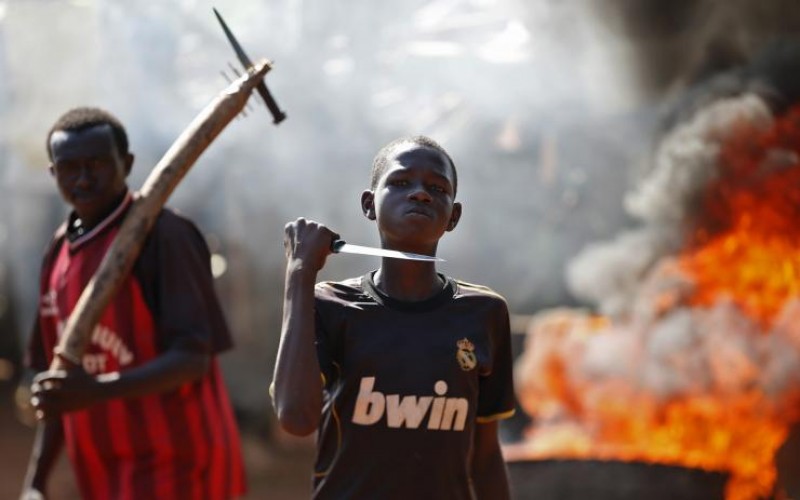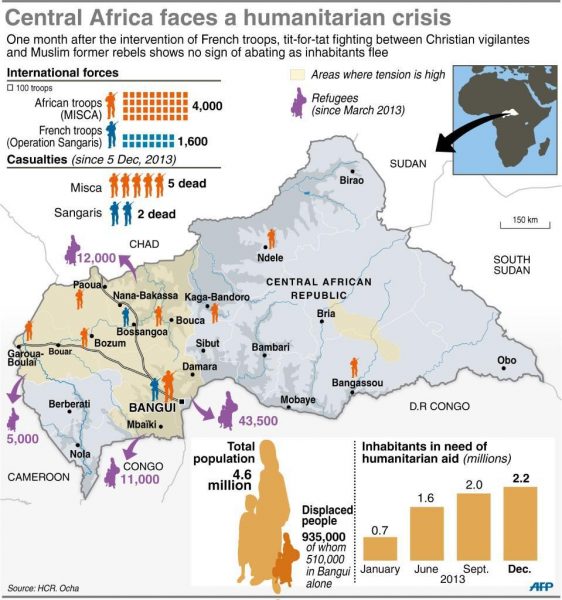The Central African Republic (CAR) has endured multiple civil wars spawning many anti-government militias. Elections have been postponed indefinitely, as Bangui descends into ethno-religious violence.

CAR’s long-running civil war can be traced to the authoritarian regimes its faced since 1960.
Colonel Jean-Bédel Bokassa became president following the 1965 Saint-Sylvestre coup d’état that toppled the first president, David Dacko. In 1972, President Bokassa declared himself ‘President for Life’ and subsequently, ‘Emperor Bokassa I of the Central African Empire.’
In 1979, with the help of France, Bokassa was overthrown and Dacko was restored to power. The subsequent governments of General André Kolingba (1981-1993) and Ange-Félix Patassé (1993 to 2003) did not fare much better.
Ange-Félix Patassé was later removed by General François Bozizé in a 2003 coup. Peace treaties previously signed as measures to end the Bush war, which began in 2004, failed to prevent renewed fighting leading to a series of clashes in December 2012.
Furthermore, the ousting of François Bozizé in March 2013 plunged CAR into its first major instance of inter-religious violence, in which at least 5,000 people were reported dead.
In March 2013, the Seleka rebel movement took power and installed Michel Djotodia as president. Security deteriorated significantly as the group killed people in horrendous attacks, especially Christian supporters of former president Bozize. In response, a group of armed young men made up of both animists and Christians erected roadblocks on country roads, extorted money, and slaughtered Muslim civilians.
While the crisis has degenerated into religious conflict, rhetoric indicates that the crisis did not start as a religious conflict – neither side based its politics on religion or used religious language and symbolism. Indeed the Seleka militia was earlier referred to as the northern rebel force.
However, as the dynamics of the conflict developed, it took on the fetters of sectarian violence.
Healing Wound Ripped Open
Seleka yielded to international pressure in January 2014 and handed power to an interim government led by Samba-Panza. The political landscape of CAR started moving toward stability following the resignation of the Seleka installed President Michel Djotodia.
In February 2014, the United Nations Security Council approved the Secretary General’s 11,000 strong UN Multidimensional Integrated Stabilization Mission in Central African Republic (MINUSCA), to join the African-led peacekeeping forces already in CAR since 2013.
Following the killing of a Muslim commercial motorcyclist on September 25th, widespread ethno-religious violence continues to spread across Bangui amid deteriorating security. Curfews have beenviolated, indicating that security officers are incapable of keeping the militias at bay.
Armed-Christian anti-balaka militias were sighted roaming the streets of Bangui on September 28th, the same day an attack on the only operational prison in Bangui led to a prison break that freed more than 500 inmates.
Regardless of the presence of regional and international peacekeeping troops, both Seleka and anti-balaka still control large parts of the northern and southern regions, respectively. Consequently, UN official Marie-Therese Bocoum has warned of an imminent civil war in the country.
Integration for National Development
Although landlocked, Central African Republic is potentially a wealthy nation, given its abundance of arable land, rainfall, wildlife, and minerals, such as uranium, crude oil, gold, diamonds and lumber. Its abundant resources notwithstanding, poverty remains deeply rooted.
The absence of internal conflicts, efficient law and order, and maintenance of democratic order are crucial determinants of foreign investment inflows. As the security situation deteriorates, recent events in CAR highlight the potential for further ethno-religious armed engagements, which could influence the dynamics of the conflict and undermine possible economic development and foreign investments.
Historically, the CAR’s northeast region has been largely marginalized and abandoned by the central government in Bangui. Going forward, the central authorities must guarantee equal political participation and economic inclusion for all regions in order to bring lasting peace and stability that will encourage investment.
sourche: http://globalriskinsights.com/2015/10/violence-in-central-african-republic-hinders-development/

Δεν υπάρχουν σχόλια:
Δημοσίευση σχολίου